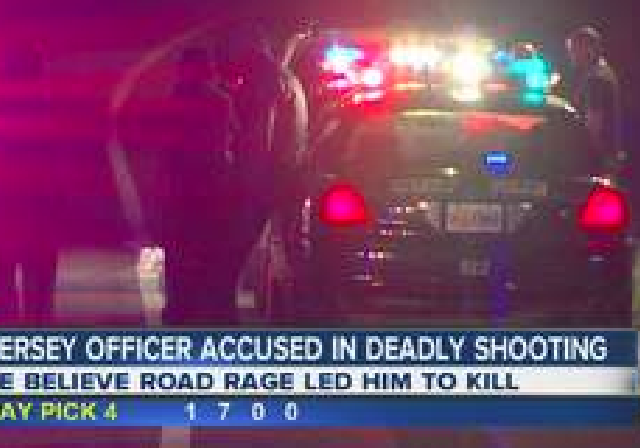Off-Duty Cop “Road Rage” Case: Cracks Appear in Prosecution Narrative
Motion to dismiss indictment unlikely to succeed, but effectively degrades prosecution’s narrative of guilt

First, full disclosure: I was contacted personally by one of the lawyers for Joseph Walker, the New Jersey law enforcement officer charged with first degree murder by Maryland in the “road rage” shooting death of Joseph Dean Harvey, Jr.
Walker’s defense attorney Charles Curlett told me that he’d seen the coverage of the Walker trial here at Legal Insurrection, and offered to send me the motion to dismiss the indictment for first degree murder and the motion to allow into evidence Walker’s polygraph results, both of which had been submitted to the trial court yesterday. (For the record, I very much doubt that this is a matter of my being somehow special — now that the documents have been filed they are public record — but rather more likely reflects the fact that the “journalists” covering this story wouldn’t have much interest in either legal document).
(We covered the essential elements of this motion to dismiss, based just on news reports, in our last post on this trial: Off-duty “Road Rage” Cop lawyer: Grand Jury given “materially false and misleading testimony”.)
Naturally I replied that I’d love to see them, and I had received them via email forthwith this afternoon.
The motion to dismiss the indictment, together with the attached exhibits, totals nearly 300 pages, and I’m afraid even I can’t move my way through 300 pages of legalese and witness interviews in a couple of hours. So far, I’ve made it through the motion itself, and the transcript of the first witness exhibit, that of Adam Pidel, the passenger riding with Joseph Dean Harvey, Jr. the night of the shooting. Both of those documents are embedded below.
The Motion to Dismiss the Indictment
In brief summary, the Attorney Curlett makes a well-reasoned and seemingly well-supported case for the dismissal of the indictment, touching upon what appears to be a considerable quantity of purportedly “materially false and misleading testimony.” In the real world, however, different courts have very different levels of sensitivity to the kinds of testimony described, as well as to the way in which it was presented to the Grand Jury. Having never practiced in Maryland I don’t have a good sense of whether they would find the described “materially false and misleading testimony” adequate cause to dismiss an indictment. In most of the courts with which I’m familiar, with the advent of trial about to begin in mere weeks, I would not anticipate a dismissal.
Even if it does not result in a dismissal of the indictment, however, the motion to dismiss the indictment sheds considerable light — and negative light, at that — on the prosecution’s narrative of guilt. This allegedly “materially false and misleading testimony” is presumably the same fundament from which the prosecution would construct its compelling narrative of guilt for the trial jury.
But in the trial setting, this same testimony is subject to vigorous cross-examination, as well as contrary evidence produced by the defense, neither of which really occurs before the Grand Jury. The State may have been able to get this allegedly “materially false and misleading testimony” past the Grand Jury yet have little or no likelihood of having it accepted as credible by the trial jury.
Exhibit A: The Same-Night Testimony of Harvey’s Passenger, Adam Pidel
Perhaps even more favorable to the defense in terms of prospective impact on the trial jury is the same-night testimony of Harvey’s passenger, Adam Pidel, who describes Harvey as the kind of guy who “definitely finishes a fight,” describes him yelling and screaming at Walker, shouting racial epithets, fully expecting that Harvey intends to engage in a fight with Walker, and who observed Harvey advancing to within feet of the minivan before being shot.
Even more important than all of the above, however, may be a wrinkle of Maryland’s law of self-defense of which I’d been ignorant until pointed in the right direction by Attorney Curlett. As I’ve stated (quite correctly) innumerable times, Maryland is very much a duty-to-retreat state when it comes to self-defense. I’ve repeatedly pointed out that Walker’s failure to take advantage of a safe avenue of retreat would appear to doom his ability to claim the legal defense of self-defense as a matter of Maryland law.
Can Walker Get Past Maryland’s “Duty-to-Retreat”? Perhaps
It appears, however, that there remains a perfectly rational legal justification for Walker’s use of defensive force in which the issue of retreat is inconsequential under the facts of this case. I haven’t time at the moment to do a full post on the issue, but I will point all of you to the most relevant Maryland court decision on the matter, and see if anyone can correctly identify the specific issue to which I’m referring.
If anyone does correctly identify the issue, the first person to comment on it here (based on the system’s date and time-stamp) will win either a free autographed copy of “The Law of Self Defense, 2nd Edition,” or a snazzy Law of Self Defense baseball cap–your choice. Only one winner, I’m the sole judge, and my ruling is beyond appeal. 🙂
Here’s the case: Lee v. State, 996 A.2d 425 (MD Ct. Spec. App. 2010)
And here’s the promised embedded Motion to Dismiss the Indictment and Exhibit A: Adam Pidel’s same-night testimony to Maryland State Troopers:
–-Andrew, @LawSelfDefense
Andrew F. Branca is an MA lawyer and the author of the seminal book “The Law of Self Defense, 2nd Edition,” available at the Law of Self Defense blog, Amazon.com (paperback and Kindle), Barnes & Noble (paperback and Nook), and elsewhere.
 DONATE
DONATE
Donations tax deductible
to the full extent allowed by law.







